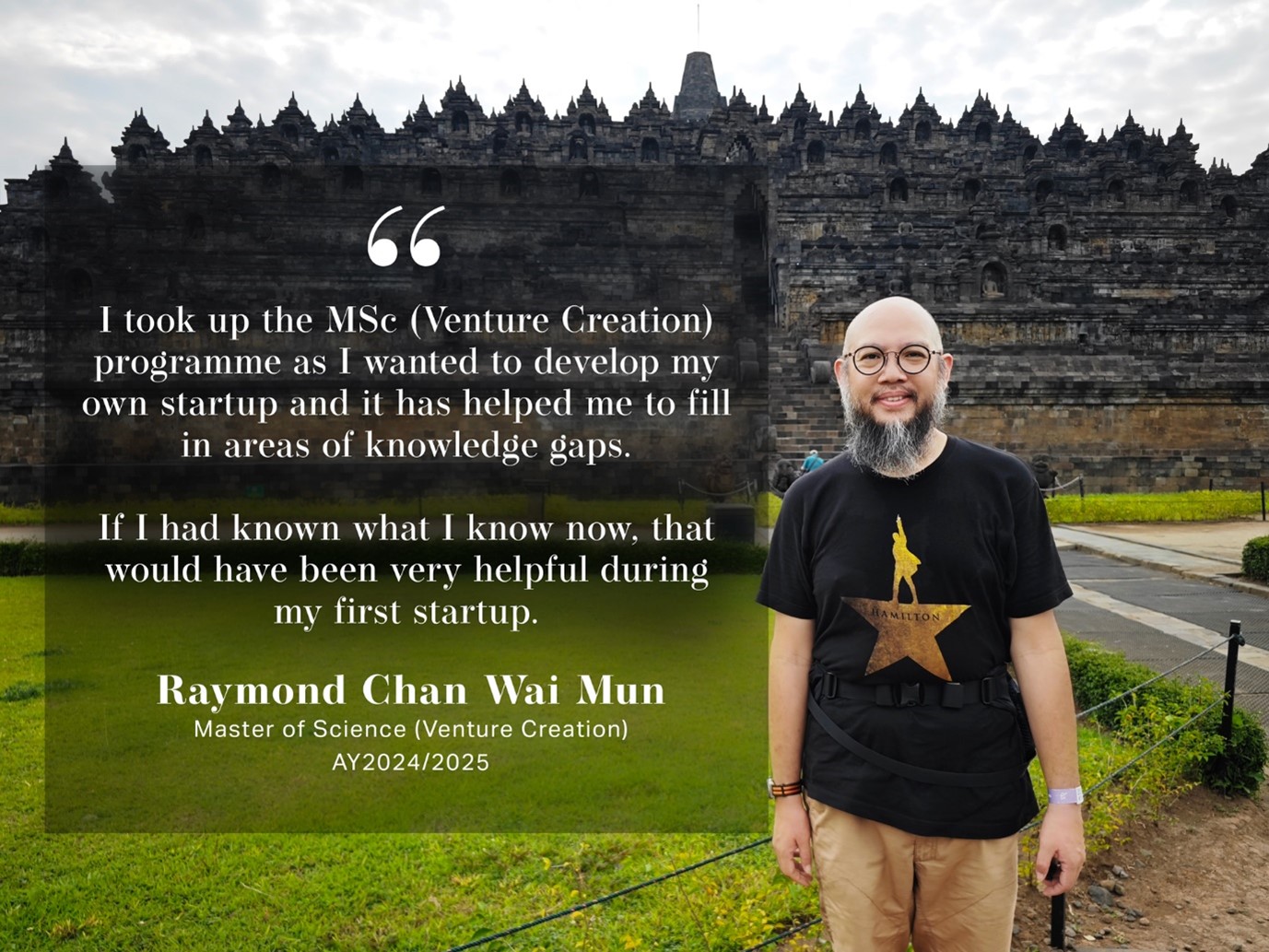Dr Raymond Chan’s résumé is nothing short of impressive. He has a PhD in Mathematics and Informatics, and has racked up more than 10 years of work experience with stints in start-ups and multinational corporations. Many would not hesitate to say he is accomplished, but he begs to differ. If his qualifications and experience have taught him anything, it is that he needs to further augment his already-remarkable skills, knowledge and abilities.
Raymond’s decision to hit the ’pause’ button on his career and go back to school stems in part from his desire to be better prepared for success in his next start-up. Since the challenges that start-ups face are often unique to their industry and their area of focus, it can be difficult for founders to possess the necessary knowledge to solve the problems that crop up.
Filling in the Gaps
After carefully considering the best options to fill in the gaps he had identified, Raymond decided to enrol in the National University of Singapore (NUS) Master of Science (Venture Creation) programme. Aimed at grooming aspiring entrepreneurs, the programme not only imparts the guidance and skillsets needed to launch new ventures, it also provides mentorship in business development, access to NUS technologies, as well as opportunities to network for market access.
Drawing from the combined expertise of six NUS academic departments, the MSc (Venture Creation) is a multidisciplinary programme designed to equip learners with capabilities across a broad range of areas through a wide selection of elective courses as well as connections to organisations such as NUS Enterprise, which has deep roots in nurturing entrepreneurship and talent.

Fit for Purpose
Even as he was finding his footing in the programme, Raymond was gaining a lot of new knowledge, particularly from the course on financing for new ventures. Part of the appreciation he has for the course came from when he was venturing into his first few start-ups; he very much wished that he was more well-versed about funding at the time.
“We mostly bootstrapped the companies and did not try to raise capital very much,” he shared. “In hindsight, if we had put more focus on financing and succeeded at that, it might have made things a lot easier and better.”
Another advantage Raymond has gleaned from the MSc (Venture Creation) programme is the opportunity to broaden his network and bounce ideas with peers who shared similar mindsets. While a Master in Business Administration (MBA) might have been the typical go-to option for people at a similar point in their careers, Raymond desired something different. Instead, he found his crowd in the MSc (Venture Creation) programme: individuals who were more receptive to out-of-the box thinking and who possessed a more entrepreneurial spirit to buck the norm.
What the Future Holds
With his studies nearing completion, Raymond is looking forward to the developing his own education technology regulatory project. In fact, his investigations into the feasibility of the project had started even before embarking onto the MSc (Venture Creation) programme.
With the rise of generative artificial intelligence (AI) and its increasing accessibility to the public, private organisations and governments both have been playing catch-up with the use and regulation for these systems. One area of concern is related to Large Language Models such ChatGPT. Using this technology, it is possible to have machines generate long-form reports and essays with just a few swift strokes of the keyboard.
The implications on education, especially with the breakneck adoption of such AI tools among students, have stirred much discussion and controversy — and piqued Raymond’s interest. The goal of his project is to explore the market feasibility of an AI governance system within the education sector. In the midst of all the sound and fury about the usage of AI in education, Raymond is curious if there would be a paying clientele for such a governance system.
During the programme, he met a fellow student, Angelia Teo, whose interest aligned with his. Angelia has since become a co-founder of the project. Interacting with other classmates also gave Raymond the chance to gain on-the-ground knowledge about the arena in which his start-up will be operating. “It made sense for me to tap into the experience of my peers, as they are the people who use these technologies the most,” he explained.
Raymond’s main source of motivation in creating his start-up does not stem from its completion. Rather, what drives him is the journey towards finding a solution for a problem. “It is really fun, because it is a continuous race; the AI natives adopt the technology and learn how to use it, and we try to keep up with — or get ahead of — them,” he shared with a grin.
Where will the future bring him? As he ventures out onto new ground, it looks like his destination will be somewhere that even an AI cannot predict.